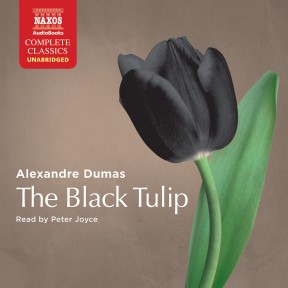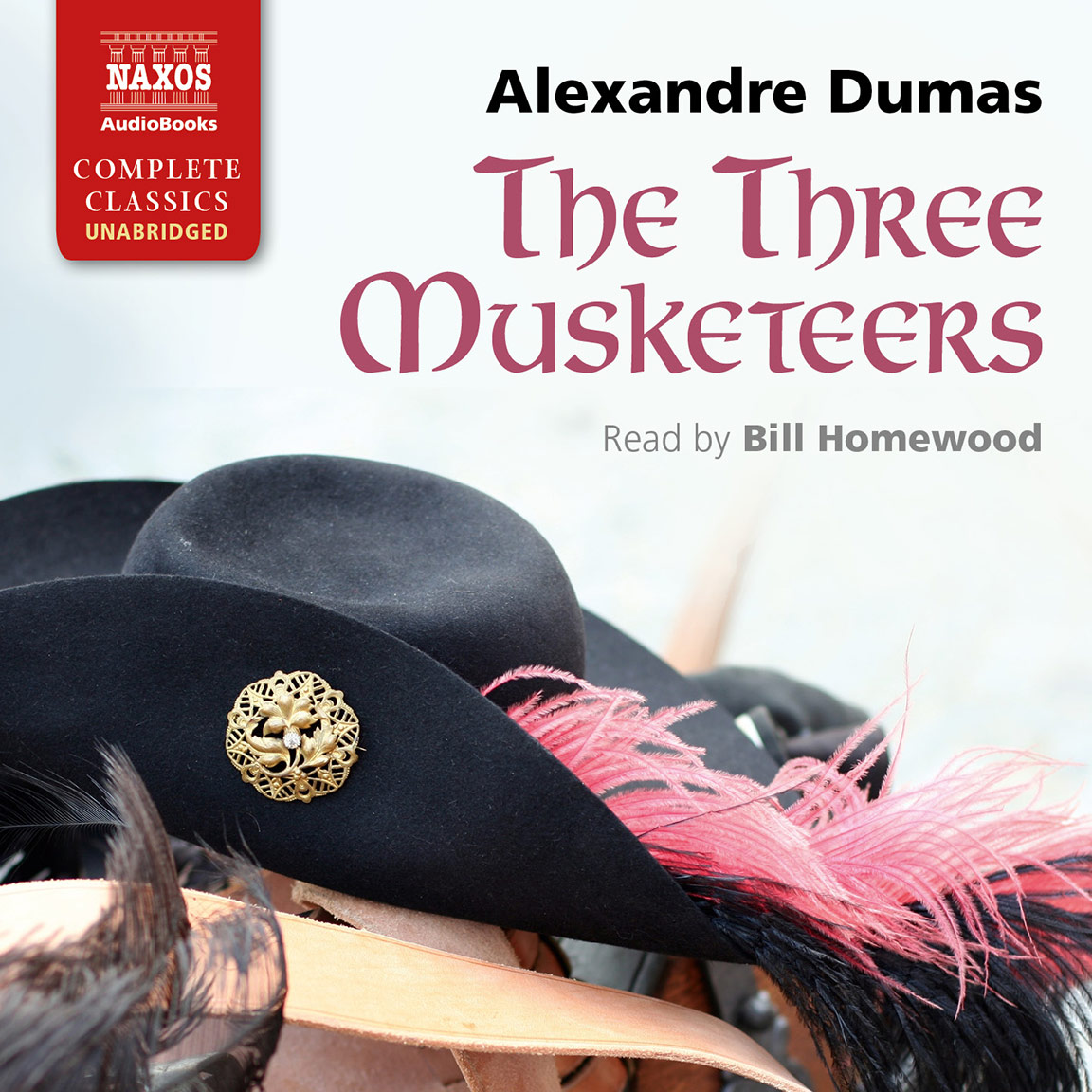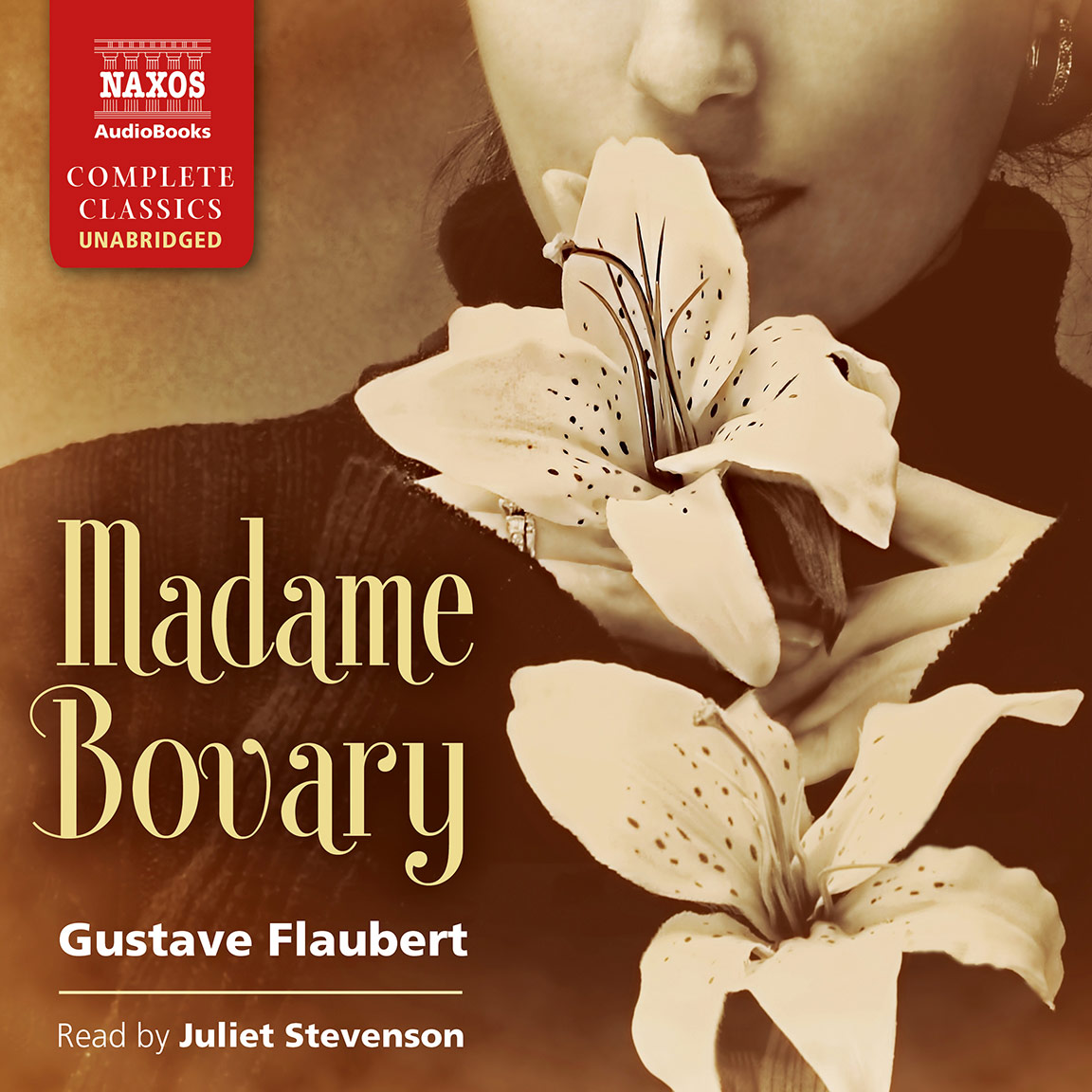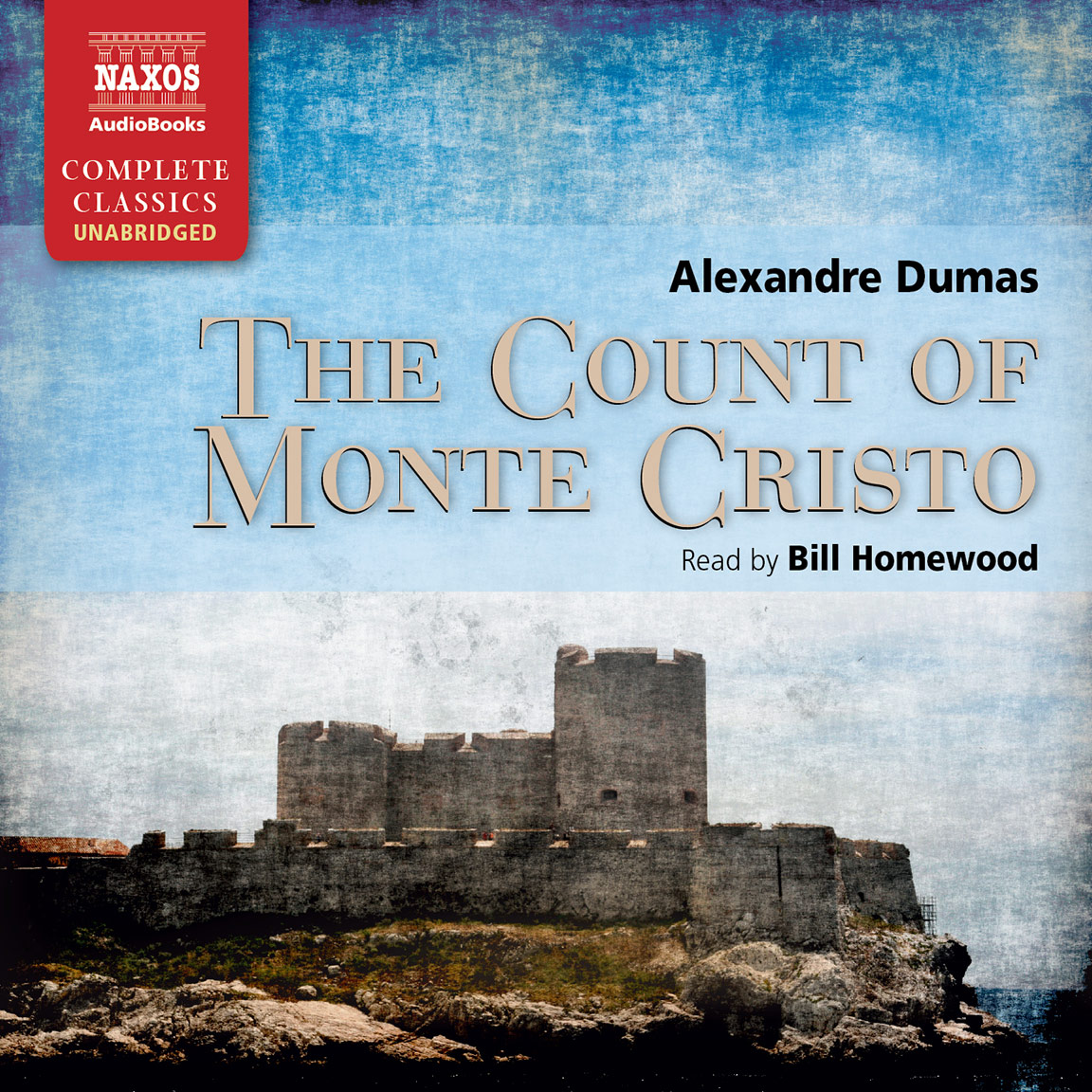
Audio Sample
Alexandre Dumas
The Black Tulip
Read by Peter Joyce
unabridged
When tulip-grower Cornelius van Baerle is framed for treason and sentenced to death, he is powerless against the brutal factional politics that put him in prison. But Rosa, the jailer’s daughter, is beautiful and strong-willed, and when they fall in love she determines not only to save him but also to grow the near mythical flower: the black tulip. Set in the savage turmoil of Holland’s late 17th century, this intimate novel celebrates the power of integrity over obsession, and tolerance over violence; and it creates in the black tulip a symbol of humanity’s potential.
-
7 CDs
Running Time: 8 h 58 m
More product details
ISBN: 978-1-84379-463-9 Digital ISBN: 978-1-84379-464-6 Cat. no.: NA0033 Download size: 124 MB BISAC: FIC004000 Released: September 2011 -
Listen to this title at Audible.com↗Buy on CD at Downpour.com↗Listen to this title at the Naxos Spoken Word Library↗
Due to copyright, this title is not currently available in your region.
You May Also Enjoy
Reviews
Published in 1850 and set against the turbulence of 17th-century Holland, this is a dramatic story of obsession, adventure, danger and romantic love. Its star is the black tulip, symbol of triumph over evil. Tulip fanatic Cornelius van Baerle is framed for treason by his jealous neighbour, but his sentence is commuted just as the executioner’s axe is raised. In prison Rosa, the jailor’s daughter, nurtures Cornelius’s dream of producing the mythical bloom. A masterly narration re-creates the full magnificence of Dumas’s theatre.
Rachel Redford, the Observer
The black tulip has come to be synonymous with the concept of artificial demand: that anything, if arbitrarily deemed rare or valuable enough, can become so expensive that its real worth is forgotten. We have come to know of certain black tulips in our own time, including the demand which was created when banks started buying up mortgaged-backed securities and the resulting fall-out. Alexandre Dumas’s The Black Tulip takes us back to an early example of this in seventeenth-century Holland, where the cultivation of tulips of all colors was a pastime of the wealthy. The Haarlem Horticultural Society devises a contest to award the person who can grow a black tulip a prize of one hundred thousand guilders (which seemed to have been a great deal of money at that time). Naturally, because greedy human beings are involved, the race to be the first one to grow the black tulip compels certain ‘tulip-fanciers’ to go to any lengths – including incrimination – to win the prize.
Cornelius van Baerle is an affluent tulip-fancier who has successfully cultivated many types of tulips. He takes up the black tulip challenge and gets very close but his envious neighbor, Mynheer Isaac Boxtel, discovers a means to get van Baerle imprisoned and hopefully executed so that Boxtel may grow the tulip and win the prize. Van Baerle would be ruined were it not for the beneficence and creative scheming of the jailer’s daughter, Rosa, who falls in love with van Baerle when he is locked up in her father’s jail, and maneuvers to save both him and the tulip.
The Black Tulip’s beginning is rather tough going for a modern listener, especially one not familiar with, or particularly interested in, the complicated political machinations of Holland four centuries ago. Dumas uses a rather lengthy, melodramatic exposition to explain the background of his main character, Cornelius van Baerle, and the ways in which this background was used to land van Baerle in prison on trumped-up charges, all in an effort to steal away the prize. If The Black Tulip were written today, there is no doubt that there would be less discussion of this old Dutch political wrangling, but once listeners make their way through this, the twists of the plot draw us in and the exposition is neatly tied to the story’s final thrilling conclusion.
A fascinating story, intertwined with a true-love tale and some truly funny moments –including Rosa’s sarcastic replies to van Baerle when he tries to convince her that he loves her more than the tulip – make The Black Tulip withstand the more than hundred and fifty years that have passed since it was published, and the emergence of more modern examples of artificial demand.
Peter Joyce, a stage, radio, and television actor, revels in the reading of Dumas’s characters and this high-stakes story. He expresses the excitement of certain crucial moments– will Rosa succeed in convincing the prince of Boxtel’s treachery in time? – through his beautiful and deep voice, carrying the listener with him through the telling.
Joanna Theiss, SoundCommentary
Alexandre Dumas is known mostly for The Three Musketeers and The Count of Monte Cristo. His novel The Black Tulip deserves to be better known, and Naxos has done something about it. In an excellently real audiobook, we are taken to late seventeenth-century Holland. There, the conflict between the Dutch and France is one theme of the book, and the obsession with tulips is another. Treason, deceit, greed and love drive the story of The Black Tulip. Peter Joyce gives it a highly dramatic reading that makes listening to the story almost compulsive.
Alide Kohlhaas, Seniors Review
The quest to grow a black tulip doesn’t have the same narrative appeal as Dumas’s Count of Monte Cristo or Three Musketeers, but it provides adventure enough for those who love the great melodramas of the nineteenth century. Peter Joyce delivers a fine rendition of Dumas’s meaty prose and is especially good at depicting villains and brutal jailers, less effective at conveying his nubile heroine. Although this is a lesser work by Dumas, the author’s judicious detachment, voiced so well in Joyce’s calm and untroubled delivery, holds the promise throughout that innocence will triumph and justice eventually prevail: The villain will be vanquished, and the power of the black tulip will somehow open the prison doors and unite the fateful lovers.
D.A.W., AudioFile
Booklet Notes
The life of Alexandre Dumas was full of licentious brio and inventive energy: passionate, individual, outrageous, laced with scandals, affairs and illegitimate children, revolutionary in politics and art, irresponsible and irrepressible, and including the apparently mandatory strange pet (Byron had a bear at university; Dumas tamed a vulture). After even the briefest glance at his life, the fact that he wrote several of the best-loved novels of all time seems like a footnote.
His grandfather was a nobleman, his grandmother a slave in what is now Haiti; his father was a Creole general of great fame and bravery who left his family very poor at his death when Alexandre was just four. The stories of his father’s bravery stayed with him, however, and were to furnish (burnish, perhaps) some of the adventures of the Three Musketeers. Alexandre lived a rather wild outdoor childhood with the same gusto and energy that he applied to the rest of his life, and learned from an early age to stand up for himself. He later bore the racism aimed at his mixed race background with considerable grace and wit; and although he was mocked (at times viciously) about it, it seems never to have held him back from preferment or success. Reckless overspending did that.
Dumas excelled
in historical
romances, and
brought the
past vividly,
thrillingly
to life
He moved from the small town of his birth to Paris as soon as he could, and managed to find a job as a clerk with the Duc d’Orléans largely because of his excellent handwriting. While working for the Duc, he continued his wide and extensive reading and took lessons in the sciences. He started to write in part because he needed the money. His mother had moved to Paris and his lover had borne his first child (also called Alexandre, later a respected, successful and wellknown writer himself). These added responsibilities were beyond the means of an extravagant clerk, and he started to produce short plays and stories. Then, seemingly just by the vigour of his determination, he created one of the most successful dramatic genres in 19th century France. Abandoning the stifling, and in his view repressive, precepts of the classics, he wrote in 1829 a historical melodrama: Henry III. The public adored it, the Romantics hailed it, the critics hated it; and, leaving his job as a clerk, Dumas arrived on the literary scene.
France in the first half of the 19th century was an unstable place, however. In 1830 the King was deposed, and Dumas’s former employer was created ‘Citizen King’. He was not enough of the former and too much of the latter for Dumas’s liking, but this republican zeal was hardly a guarantee of success, and his works immediately after Henri III were failures. It was another few years before he created – again, largely out of a need for money – another hugely popular dramatic genre with Antony, this time a domestic melodrama, one where the passions were expressed and illicit matters discussed. It was again a huge success. This second rise to popularity allowed Dumas to express himself further; he lived in magnificent style and liked to be seen living in this way. He gave a huge costume ball in 1833 at which le tout monde of the arts was invited – the rooms were decorated by Delacroix – and it was the talk of society for years. Throughout the 1830s, he wrote warmly received travel pieces about his time in Switzerland, Italy, Belgium and Germany, trips undertaken partly because of health concerns, but also because his avowed republicanism made him a target at home. They were popular, though, and allowed him to develop narrative skills, resulting in a shift to novel writing.
By the mid 1840s, he had had at least two illegitimate children, had married and almost immediately separated from his wife (the marriage was a financial convenience, although its fiscal success was not much longer than its marital one), and was one of the great men of his age, as well known for his outfits as his work. And what work! He had written The Three Musketeers, The Count of Monte Cristo and The Man in the Iron Mask. He had opened his own theatre, and had even become a mayor. Purely in terms of quantity, Dumas’s output was beyond prodigious, beyond overwhelming. He worked extensively with others, especially Auguste Maquet, but his energy and drive were frequently too much for them. They would bring him material thought to be worth attention but dully written and he would invest it with his personal style, panache, dialogue and more. He worked 14 hours a day, wearing out scores of collaborators, and created a kind of industrial production line of novels, plays, journalism, travelwriting and essays (although he successfully sued a rival who accused him of such a process). The numbers are almost incalculable, and in some cases extremely doubtful, for he was often – and often rightly – accused of plagiarism. He would claim almost anything as his, and there is a story that he nearly gave his name to someone else’s prose edition of the Iliad.
The Black Tulip was published in 1850 and is something of a departure for Dumas, being a much more intimate tale. Typically it does relish the bloodthirsty (and largely true) events in 17th-century Holland; but its general focus is on the love affair between Cornelius and Rosa, and it has as a central theme the tulip itself. This may well have a symbolic resonance, since Dumas does not spend much time on the issue of the tulip mania that gripped the Netherlands at the time but concentrates on the idea that such a near mythic plant can survive and grow under the very heels of oppression, much as does the love between Cornelius and Rosa.
Dumas fell into and out of fashion over the next 20 years, earned and spent several fortunes, was involved in the uprisings of 1848 in France, and befriended Garibaldi during Italy’s unification. As a result of this last development he became for four years the head of excavations and museums in Italy, and lived in Naples. He founded newspapers and magazines, scandalised society by being pictured with one of his mistresses, and was a dedicated gourmet and gourmand, writing a dictionary of cookery in the 1860s and frequently running from meals to the kitchen to get the recipe. He was occasionally obliged to run from France too, either for financial or political reasons, but he travelled widely in Europe as well as North Africa (where he found the vulture). He was profoundly good-natured and gregarious but the endless work was always going to wear him down (although his death came relatively quickly). In 1870 he moved in with his son near Dieppe, and died that December.
Dumas excelled in historical romances, and brought the past vividly, thrillingly to life, with a stirring sense of adventure and especially strong dialogue, something he had honed from his years as a dramatist. He represented a new kind of pragmatic, liberal Romanticism and gave expression to personal and artistic freedom – from repression, from convention, from stultifying ordinariness. He was a bursting barrel of invention and goodheartedness. He was for life.
Notes by Roy McMillan




